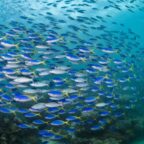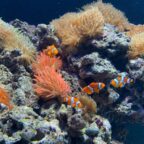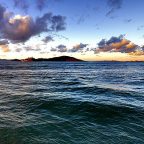
The year 2018 saw the world’s oceans at a crossroads. Some of the world’s most important marine areas came under new and stronger protections. At the same time, the precarious health of the oceans was never clearer, with rapidly rising sea levels, coral bleaching and overfishing.
What does the new year hold for ocean conservation? Human Nature sat down with Aulani Wilhelm, senior vice president of Conservation International’s Center for Oceans, for a look ahead.
Question: What do you see as being the biggest focus in ocean conservation in 2019?
Answer: I think in the next year, the role of oceans and the need to stabilize our oceans in order to cope with climate change is going to become increasingly inescapable. I think we are going to see more and more erratic weather and results of a climate that has already changed and — hopefully — an awakening of how much the ocean impacts individuals, no matter how far away they live from the coast.
Q: How aware do you find that people are of the issues our oceans are facing?
A: For a lot of people, the changes our oceans have undergone have flown under the radar. And not only for people that live far from the coast, but even those who live along it — many are unaware of both the values and impacts that oceans have on their lives and everyday well-being. While I’d like to say that there is an awakening with regards to this, we still have a long way to go in having people really grasp the changing climate of many things — not only the literal climate, but how the intersection of globalization and technology and global shifts in politics are really all converging and what that will mean for the quality of life for people on the planet.
I also think 2019 may be a year where the developed world may begin to see that the developing world will have several advantages in terms of preparedness and may be ahead of the game in coping with this changing climate on many fronts.
Q: What makes you say that?
A: There are so many more degrees of separation in the developed world that people have from the sources of life on the planet. The environment has become increasingly separate from the daily lives of many, so turning that around and making those reconnections can sometimes be more difficult for developed countries.
Sometimes, even when individuals in the developed world want to make change, it seems as though personal actions can’t make a difference because the political, social and governance systems are complicated and not set up to be easily redesigned. And in some of the more developed countries, infrastructure systems — water, waste, recycling, energy delivery, land use — are big and often municipal versus small and distributed. I think in response to climate, we will need scaled solutions that are vertical in nature and also solutions that are small and horizontal to help change how we think about coping and making the changes required so that we can get back to a closeness to the planet once again.
Q: What is Conservation International working on to address some of these issues?
A: In 2019, our focus is on scaling how we conserve and protect oceans. What that means is scaling place-based conservation to protect as much as we can as quickly as we can. It also means working with industry, retailers and fishing communities to scale fisheries solutions and drive social responsibility across supply chains. It will also be a year of deepening and broadening partnerships and alliances to more effectively deliver and amplify our work. The Global Mangrove Alliance that we helped establish, and has now grown to more than a dozen partnerships with other global and local actors, is one such collaboration that has tremendous potential and will benefit from a focused push this year. For me, the most exciting part of this alliance is that its flipping the typical way we deliver conservation, from a model of competition to a model of trust, shared goals and collaboration. Really, it’s about acting on the idea that organizations from civil society, governments and the private sector can do more and do better together.
Q: There has been a lot of news about plastic pollution in the oceans — what is Conservation International doing in that space in 2019?
A: Solving the plastic pollution crisis is difficult because the problem is large and multisectoral, and the solution will have to be as well. We have spent the last year plugging into scientific advisory groups and alliances working on this issue so we can evaluate where we can have the most impact. Some questions we are asking include: How can we create incentives for companies that use plastic to include more recycled material in their products; this may include a crediting system. The biggest issue that we see is the variety of plastic materials that are not suitable for recycling (e.g. thin films, diapers, chip bags). How can we support the technological advancements, such as chemical recycling, as a way of dealing with these products? Can we connect it to health when we know that every floating piece of plastic that collects rainwater increases habitat for mosquitoes or when plastic is making its way up the food chain? In this way, how could we connect the human health implications of plastic in a more direct way to forge new partnerships to be able to solve this differently? And similar to what we are doing with coffee and palm oil, can we work with plastics manufacturers to figure out how single-use plastics, which in some cases are necessary, can be redesigned to make sure they are less toxic, less polluting and made from renewable resources to the degree they can be in order to be used differently and more responsibly?
Encouragingly, there is a lot more conversation around circular systems, and we need to add another “re-” in terms of reduce, reuse, recycle and really emphasize redesign. Recycling often makes consumers think that they have done their part, but it actually compounds the problem, so we need to prioritize redesign and reduction as the key complementary actions to accelerate solutions.















Social Profiles